Vitamin Water
Glaceau Vitamin Water is a popular beverage owned by The Coca-Cola Company [1]. They advertise Vitamin Water as a healthy beverage packed with vitamins and electrolytes. They claim that Vitamin Water offers “benefits that make it easy to get the good stuff that your body needs” [1].
With the different variety of flavors being named: “energy,” “revive,” “refresh,” and “focus,” how could it not provide the benefits that they claim to offer [1]? But is vitamin water really as good for you as they say it is? Let’s find out!
Ingredients and Nutrition Facts
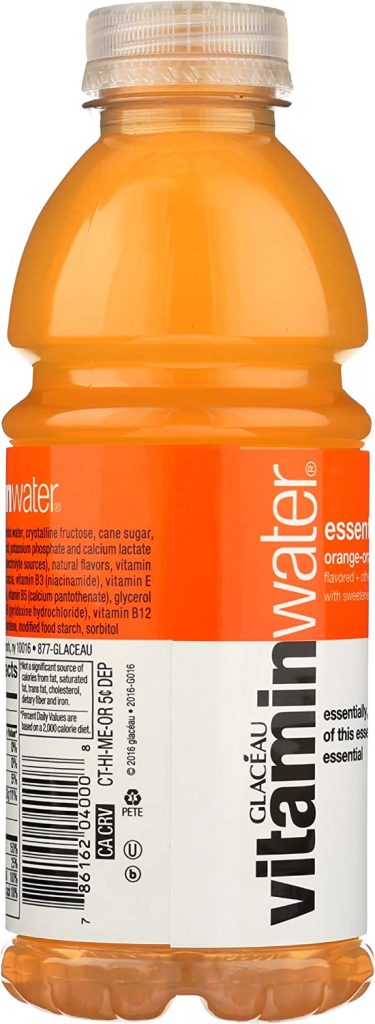
Vitamin Water
Ingredients in Vitamin Water
- Reverse osmosis water
- Crystalline fructose
- Vitamin C
- Vitamin E (in some varieties)
- B Vitamins – B3, B5, B6, B7, B12 (varies depending on variety)
- Electrolytes – magnesium lactate, calcium lactate, and potassium phosphate
- Caffeine (in some varieties)
- Cane Sugar
- Stevia leaf extract (in some varieties)
- Citric acid
- Gum acacia
- Beta-carotene or fruit and vegetable juice for color
- Natural flavors
Nutrition Facts for Vitamin Water
- 100 calories per serving (1 bottle) (consistent for every variety)
- Sodium 0mg
- Total Carbohydrates 26-33g (depending on variety)
- Total Sugars 26-32g (depending on variety)
- Protein 0g
- Vitamins and minerals 100-200% of daily requirements (depending on variety)
Vitamin Water – Zero Sugar
Ingredients in Vitamin Water – Zero Sugar
- Reverse osmosis water
- Vitamin A (in some varieties)
- Vitamin C
- Vitamin E (in some varieties)
- B Vitamins – B3, B5, B6, B7, B12 (varies depending on variety)
- Electrolytes – magnesium lactate, calcium lactate, and potassium phosphate
- Citric acid
- Stevia leaf extract
- Erythritol (in some varieties)
- Gum acacia (in some varieties)
- Fruit and vegetable juice for color
- Natural flavors
Nutrition Facts for Vitamin Water – Zero Sugar
- 0 to 10 calories per serving (1 bottle) (depending on variety)
- Sodium 0mg
- Total Carbohydrates 0-5g
- Total Sugars 0g
- Protein 0g
- Vitamins and minerals 100-200% of daily requirements (depending on variety)
Ingredient Breakdown
Vitamins
Every variety of vitamin water contains at least 100% of an adult’s daily intake of vitamins.
Vitamins are essential for health, and our bodies rely on them to function properly [2].
While this may appear to be a health benefit of vitamin water, most adults consume enough vitamins through the foods that they eat every day [2]. The National Center for Complementary and Integrative Health states that people may supplement vitamins and minerals if they do not get enough from the foods that they eat [2]. However, if you consume enough nutrients through food, supplementing vitamins and minerals can increase the risk of getting too many nutrients [2].
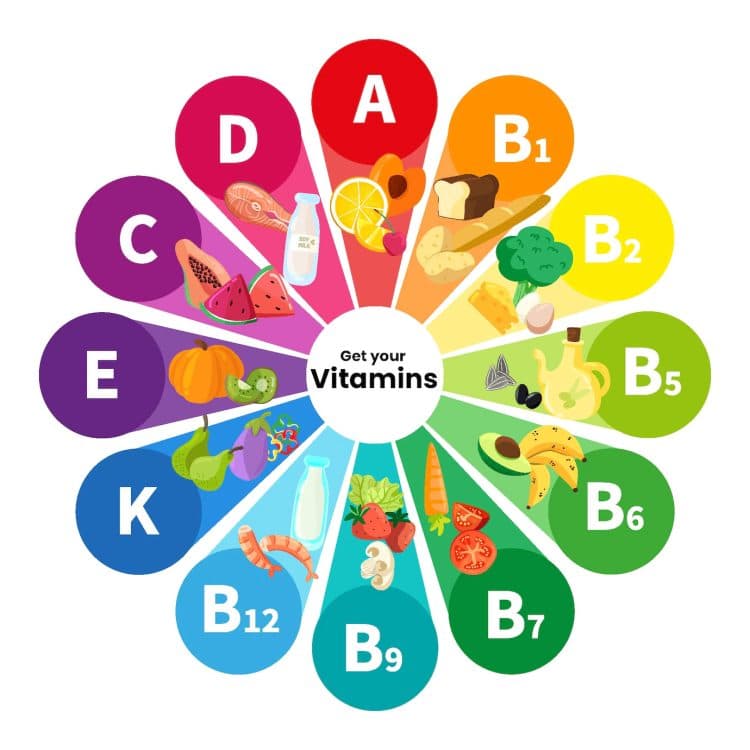
Vitamin A
Vitamin A is a fat-soluble vitamin that is found naturally in food sources [3, 4]. There are two sources of vitamin A, retinoids and carotene. Retinoids are found in beef liver, fish, shrimp, eggs, milf, cheese, and butter [3, 4]. Carotene is found in green, yellow, and orange vegetables, like leafy greens, carrots, or squash [3, 4].
The recommended dietary allowance of vitamin A for an adult is 900 mcg per day, and the upper limit is 3,000 mcg [3,4]. Vitamin A deficiencies are very rare in the United States because we eat enough foods that provide vitamin A [4].
Vitamin A supports the immune system and organ function, lowering the risk of prostate and lung cancers, supporting bone growth, and vision support and protection [3, 4].
Consuming too much vitamin A in supplements can cause side effects, such as dizziness, nausea, blurred vision, headaches, birth defects if pregnant, and in severe cases, death or coma [4].
Since the average American consumes enough vitamin A in their diet, supplementation is not necessary and may be harmful. Vitamin Water varieties contain at least 100% of an adult’s daily recommendation of vitamin A, which is much more than your body needs, if not too much.
Vitamin C
Vitamin C is a water-soluble vitamin that is naturally occurring in foods [3, 5]. Some sources of vitamin C include citrus fruits, bell peppers, broccoli, brussels sprouts, tomatoes, and strawberries [3, 5].
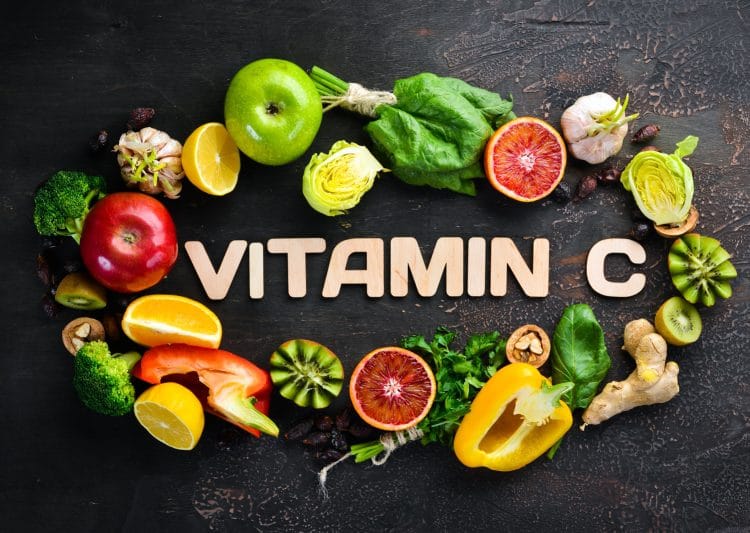
The recommended dietary allowance of vitamin C is 90 mg for adult men and 75 mg for women per day [3, 5]. Most people get enough vitamin C from food [5]. But deficiencies may occur in people who smoke, have cancer, or eat a limited variety of food [5].
Vitamin C helps the body make collagen and improves iron absorption [3, 5]. It also acts as an antioxidant, which protects cells from damage [3, 5]. Vitamin C may lower the risks of certain cancers, offer protection again cardiovascular disease, and boost your immune system to fight cold symptoms [3, 5].
Too much vitamin C can be harmful and result in unpleasant side effects such as stomach cramps, nausea, and diarrhea [5].
Vitamin Water contains at least 100% of an adult’s daily recommended amount of vitamin C, which may be too much for most people.
Related: 10 Best Vitamin C Supplements.
Niacin (Vitamin B3)
Niacin, also known as Vitamin B3, helps your body convert food into energy [3, 7]. Niacin is prevalent in many foods, such as meats, fish, poultry, legumes, grains, nuts, and fortified foods [3, 7].
The recommended dietary allowance of niacin is 16 mg for adult men and 14 mg for women per day [3, 7]. Niacin deficiencies are very rare, as people can consume enough from food [7].
Not only does niacin help your body convert food for energy, but it is also essential for the development and function of cells, blood cells, skin, brain, and the nervous system [3, 7]. Large doses of niacin may reduce the risk of cardiovascular disease and improve cholesterol [7].
It is not recommended to consume more than 30 mg of niacin per day (unless prescribed), as it can lead to the development of headaches, dizziness, and skin rashes [7].
Vitamin water provides 100% of your daily recommended amount of niacin. Depending on your diet, this may not cause any symptoms. However, eating a lot of fortified foods and meats may place you over the recommended upper limit of 30 mg of niacin per day.
Vitamin E
Vitamin E, also known as alpha-tocopherol, is a fat-soluble vitamin that is found in foods such as vegetable oils, nuts, seeds, whole grains, and leafy green vegetables [3, 6].
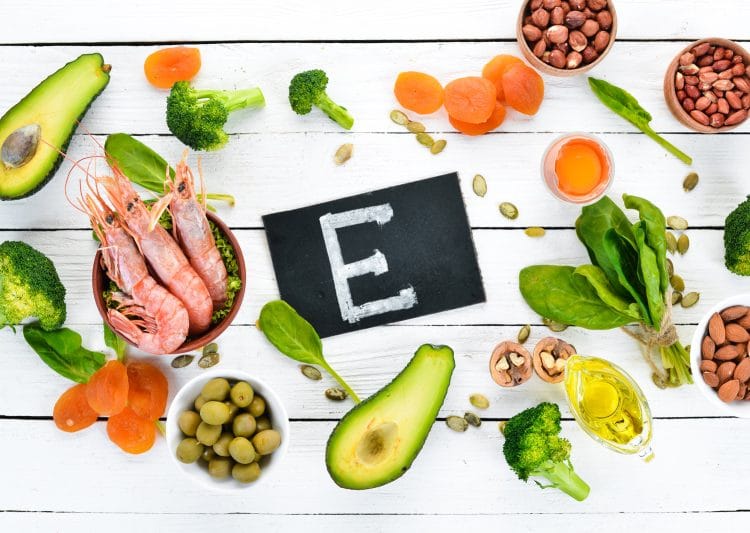
The recommended dietary allowance of vitamin E for adults is 15 mg per day [3, 6]. Nutritional needs for vitamin E are met through eating a balanced healthy diet [6].
Vitamin E is beneficial in preventing or delaying Alzheimer’s, coronary heart disease, cancer, and age-related eye disorders [3, 6]. It also acts as an antioxidant that can prevent cell damage [3, 6].
Consuming excess vitamin E does not generally provide any risks [6]. However, an extremely high dose may cause hemorrhagic stroke [6].
Even though Vitamin Water provides 100% of an adult’s daily vitamin E needs, the amount does not pose any health risks.
Pantothenic Acid (Vitamin B5)
Pantothenic acid, also referred to as vitamin B5, is naturally present and consumed through foods such as poultry, beef, seafood, eggs, milk, whole grains, broccoli, potatoes, mushrooms, peanuts, and sunflower seeds [3, 8].
The recommended dietary allowance of pantothenic acid is 5 mg for adults per day [3, 8]. In the United States, most people consume enough pantothenic acid in their diets and do not need to take supplements [8].
Pantothenic acid, like niacin, helps the body convert food into energy [3, 8]. It also helps make and break down lipids and also helps make hemoglobin, steroid hormones, and neurotransmitters [3, 8].
Pantothenic acid is safe to consume at high doses [8]. Only consuming more than 10,000 mg per day will produce undesirable side effects such as diarrhea [8]. The amount of pantothenic acid in Vitamin Water is considered safe.
Vitamin B6
Vitamin B6 is naturally found in foods like meats, legumes, soy products, starchy vegetables, and non-citrus fruits [3, 9].
The recommended dietary allowance of vitamin B6 for adults is 1.3 mg per day [3, 9]. Most people can consume enough vitamin B6 in their diets [9]. However, those with kidney issues, autoimmune disorders, or alcohol dependence may have low levels of vitamin B6 [9].
Vitamin B6 can help reduce the risk of heart disease, cancer, and cognitive functioning [3, 9]. It plays a key role in the enzyme reactions in the metabolism and the conversion of tryptophan to niacin and serotonin [3, 9]. It also helps make red blood cells, supports the immune system, and supports cognitive development [3].
People rarely consume too much vitamin B6 [9]. However, supplementing vitamin B6 for over a year is known to cause nerve damage [9].
Vitamin Water contains at least 100% of your daily recommended amount for vitamin B6, which is generally safe. However, drinking vitamin water daily for over a year may increase the risk of nerve damage [9].
Biotin (Vitamin B7)
Biotin, aka Vitamin B7, is a water-soluble vitamin that is found naturally in eggs, salmon, beef liver, avocados, soybeans, sweet potatoes, nuts, and seeds [3, 10].

The adequate intake level of biotin for adults is 30 mcg per day [10]. Biotin deficiency is very rare as enough can be consumed through food [10]. However, an average of 30% of pregnant women may experience mild biotin deficiencies [10].
Biotin aids in the breakdown of carbohydrates, fats, and protein and helps convert them into energy [3, 10]. It is also needed to maintain healthy skin and hair and regulate the activity of cells and genes [10].
There is no evidence that excess biotin can cause any side effects, and there is no upper limit for biotin consumption [10]. The amount of biotin in Vitamin Water can be considered safe [10].
Vitamin B12
Vitamin B12 is found in animal products and fortified foods, such as fortified breakfast cereals [3, 11]. Plants do not contain vitamin B12 [11].
The recommended dietary allowance of vitamin B12 for adults is 2.4 mcg per day [3, 11]. Most people consume enough vitamin B12 in their diets, but vegetarians may not consume enough as vitamin B12 comes mainly from animal products [11]. Those who have had weight loss surgery and those with digestive disorders may have issues absorbing vitamin B12, leading to deficiency [11].
Vitamin B12 helps create red blood cells, nerve cells, and DNA [3, 11]. It also assists in the breakdown of amino acids and lipids [3]. Research shows that vitamin B12 may reduce the risk of cancer, heart disease, and dementia [11].
Vitamin B12 in high doses does not cause any adverse symptoms or toxicity [11]. The amount of vitamin B12 in Vitamin Water would be considered safe.
Electrolytes
Electrolytes are electrically charged minerals that are found in the body’s blood, tissues, and other fluids [12]. They are needed for the body to maintain water and pH balance, move nutrients into cells, excrete wastes from cells, and assist in muscle, nerve, heart, and brain functioning [12].
Electrolytes are sodium, calcium, potassium, phosphate, chloride, and magnesium [12]. Each electrolyte can be consumed through the foods that we eat and the fluids we drink [12].
Vitamin Water labels electrolytes as magnesium lactate, calcium lactate, and potassium phosphate. While magnesium, calcium, potassium, and phosphate are electrolytes in their natural form, magnesium lactate, calcium lactate, and potassium phosphate are commercially produced food additives [12, 13, 14, 15]. Magnesium lactate is a source of dietary magnesium that is added to fruit-flavored beverages [12]. Calcium lactate and potassium phosphate are food additives often used as stabilizers or thickening agents [14, 15]. It is questionable if these forms meet the body’s needs for electrolytes or if Vitamin Water utilizes them as a food additive while labeling them as electrolytes.
Not a single variety of Vitamin Water contains any form of sodium or chloride, both of which are highly necessary electrolytes [12]. Since Vitamin Water states 0 mg of sodium on the nutrition label, it is questionable if you should consider Vitamin Water as an electrolyte drink.
Sugar and Sweeteners
Depending on the variety of Vitamin Water, it will either be sweetened with crystalline fructose, cane sugar, erythritol, or stevia leaf extract. Some varieties contain a combination of these sweeteners.
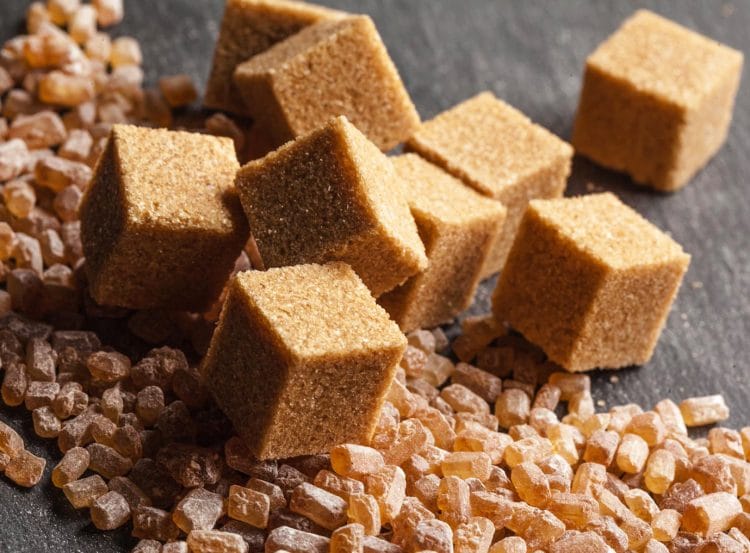
The USDA suggests that adults should not consume more than 10% of their daily calories in added sugars [17]. This means that if your daily caloric intake is 2,000 calories a day, you should not consume more than 200 calories from added sugars, which equals 50 grams of added sugars (12 teaspoons). However, the American Heart Association recommends limiting added sugars to no more than 6% of your daily calories [18].
Vitamin Water (not including Vitamin Water Zero) contains 26 to 32 grams of sugar per bottle [1]. This is equal to or more than half of the recommended limit of added sugar intake, depending on your daily caloric intake.
Crystalline Fructose and Cane Sugar
Crystalline fructose and cane sugar are both calorie-containing sweeteners. High consumption of crystalline fructose or cane sugar is associated with increasing an individual’s risk of developing type 2 diabetes, obesity, and cardiovascular disease [19].
Erythritol
Erythritol is a sugar alcohol that is used in place of sugar in beverages [20]. Erythritol is a zero-calorie sweeter. It is safe for consumption, and there are few side effects of consuming erythritol [20]. It is the preferred form of sugar alcohol as it is easier to digest than other sugar alcohols [20].
Stevia Leaf Extract
Stevia leaf extract is a zero-calorie sweetener that is used as an alternative to sugar in beverages [21]. It is safe to consume and can help individuals with calorie reduction [21]. Used in place of regular sugars, it can benefit weight management and limit the risk of developing type 2 diabetes [21].
Natural Flavors
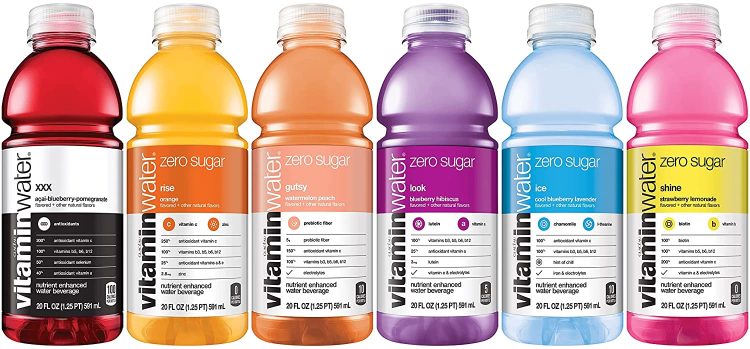
Natural flavors are not as natural as they appear to be. Natural flavors are created in laboratories by chemists [22]. They extract raw material from food or spices and use it to develop natural flavor [22]. The goal of creating a natural flavor is to create a dense concentration of aromatics [22]. They extract, distill, or cold press the raw materials, then remove color, water, and other materials [22].
Additives such as artificial or synthetic modifiers, emulsifiers, or solvents are permittable additions because they do not impact the flavor [22]. Research shows that up to 90% of natural flavors contain additional ingredients [22].
All this considered, Vitamin Water is not as naturally flavored as they claim it is.
[sc name=”style-blue-box” ]
Get Vitamin Water ZERO Sugar All Flavor Variety Pack at Amazon.com
[/sc]
Vitamin Water: Is It Good For You?
While Vitamin Water claims to be a drink that is good for you, after reviewing the ingredients, you may change your mind.
Even though Vitamin Water is packed with vitamins, one bottle of Vitamin Water provides at least 100% of an adult’s daily vitamin requirements (for the listed vitamins). This often leads to an overconsumption of vitamins, as most adults in the United States consume enough vitamins through the foods they eat.
The electrolytes that Vitamin Water claims to include are commercially produced food additives, not electrolytes in their natural form. This brings into question if Vitamin Water really provides your body with electrolytes.
The zero sugar varieties of Vitamin Water contain erythritol and stevia leaf extract, which are not known to cause harm and are safe. However, the sugar-containing varieties of Vitamin Water contain at least half or more of an adult’s daily sugar limit. For comparison, Vitamin Water contains 26 to 32 grams of sugar per bottle, and one bottle of Coca-Cola contains 65 grams of sugar [1, 23]. Vitamin Water contains almost half of the amount of sugar as Coca-Cola. If you drink two bottles of vitamin water, it is no healthier than drinking a bottle of Coka-Cola.
Lastly, natural flavors are lab-created. They are not as natural or healthy as they sound.
Is Vitamin Water good for you? Vitamin Water Zero Sugar is much better than the original sugar-containing product. But, the number of vitamins packed into vitamin water will not do anything more for your body as you most likely consume enough through food. Is it good for you? Not necessarily. It is definitely not needed.
FAQs
What is the healthiest Vitamin Water?
If you want to drink the healthier Vitamin Waters, pick Vitamin Water Zero Sugar. Vitamin Water Zero Sugar does not contain any added sugar.
What are the negative effects of Vitamin Water?
Vitamin Water contains a high amount of sugar which can increase your risk for developing type 2 diabetes and obesity. It also contains over 100% of your daily vitamin needs, and the overconsumption of vitamins may pose health risks.
Can I drink Vitamin Water instead of water?
Drinking a drink that contains sugar, artificial sugars, an excessive amount of vitamins, and other various ingredients is not comparable to the nutritional value that water can provide.
Can I drink Vitamin Water every day?
You could, but it would not be good for you. Vitamin Water contains an excessive amount of vitamins, and some vitamins in excess can cause undesirable side effects.
Wrapping Up
Vitamin Water, owned by The Coca-Cola Company, uses creative advertising to make it appear to be a healthy drink to consumers. But, overall, it is a sugar-packed drink that contains more vitamins than your body needs. Vitamin Water Zero Sugar is a better alternative to the original product, but the amount of vitamins it contains is not necessarily good for you to consume.
References
- Glaceau Vitamin Water – Coca-Cola Company. (n.d.). vitaminwater. Official Vitaminwater Website. https://www.vitaminwater.com/
- National Center For Complementary and Integrative Health. (2022, June). Vitamins and Minerals. NCCIH. https://www.nccih.nih.gov/health/vitamins-and-minerals
- Harvard Health. (2020, August). Listing of vitamins. https://www.health.harvard.edu/staying-healthy/listing_of_vitamins
- US Department Of Health and Human Services (USDHHS), National Institutes of Health (NIH), Office of Dietary Supplements. (2022, June). Dietary Supplement Label Database (DSLD) – Vitamin A and Carotenoids. Office Of Dietary Supplements. https://ods.od.nih.gov/factsheets/VitaminA-Consumer/
- USDHHS, NIH, Office of Dietary Supplements. (2021, May). Dietary Supplement Label Database (DSLD) – Vitamin C. Office Of Dietary Supplements. https://ods.od.nih.gov/factsheets/VitaminC-Consumer/
- USDHHS, NIH, Office of Dietary Supplements. (2021, May). Dietary Supplement Label Database (DSLD) – Vitamin E. Office Of Dietary Supplements. https://ods.od.nih.gov/factsheets/VitaminE-HealthProfessional/
- USDHHS, NIH, Office of Dietary Supplements. (2021, May). Dietary Supplement Label Database (DSLD) – Niacin. Office Of Dietary Supplements. https://ods.od.nih.gov/factsheets/Niacin-Consumer/
- USDHHS, NIH, Office of Dietary Supplements. (2022, March). Dietary Supplement Label Database (DSLD) – Pantothenic Acid. Office Of Dietary Supplements. https://ods.od.nih.gov/factsheets/PantothenicAcid-Consumer/
- USDHHS, NIH, Office of Dietary Supplements. (2022, March). Dietary Supplement Label Database (DSLD) – Vitamin B6. Office Of Dietary Supplements. https://ods.od.nih.gov/factsheets/VitaminB6-Consumer/
- Harvard Health. (2020a, August 21). Biotin – Vitamin B7. The Nutrition Source.
- USDHHS, NIH, Office of Dietary Supplements. (2021, July). Dietary Supplement Label Database (DSLD) – Vitamin B12. Office Of Dietary Supplements. https://ods.od.nih.gov/factsheets/VitaminB12-Consumer/
- Medline Plus. (2016, June). Fluid and Electrolyte Balance. https://medlineplus.gov/fluidandelectrolytebalance.html
- National Center for Biotechnology Information (2022). PubChem Compound Summary for CID 6536825, Magnesium lactate. https://pubchem.ncbi.nlm.nih.gov/compound/Magnesium-lactate.
- National Center for Biotechnology Information (2022). PubChem Compound Summary for CID 6536825, Magnesium lactate. https://pubchem.ncbi.nlm.nih.gov/compound/Magnesium-lactate.
- National Center for Biotechnology Information (2022). PubChem Compound Summary for CID 62657, Potassium phosphate. https://pubchem.ncbi.nlm.nih.gov/compound/Potassium-phosphate.
- Shrimanker, I., & Bhattarai, S. (2021). Electrolytes. In StatPearls. StatPearls Publishing. https://pubmed.ncbi.nlm.nih.gov/31082167/
- U.S. Department of Agriculture and U.S. Department of Health and Human Services. Dietary Guidelines for Americans, 2020-2025. 9th Edition.
- American Heart Association. (2021, November 2). Added Sugars. www.Heart.org.
- Malik, V. S., & Hu, F. B. (2015). Fructose and Cardiometabolic Health. Journal of the American College of Cardiology, 66(14), 1615–1624. https://doi.org/10.1016/j.jacc.2015.08.025
- Boesten, D. M. P. H. J., den Hartog, G. J. M., de Cock, P., Bosscher, D., Bonnema, A., & Bast, A. (2015). Health effects of erythritol. Nutrafoods, 14(1), 3–9. https://doi.org/10.1007/s13749-014-0067-5
- Samuel, P., Ayoob, K. T., Magnuson, B. A., Wölwer-Rieck, U., Jeppesen, P. B., Rogers, P. J., Rowland, I., & Mathews, R. (2018). Stevia Leaf to Stevia Sweetener: Exploring Its Science, Benefits, and Future Potential. The Journal of Nutrition, 148(7), 1186S-1205S. https://doi.org/10.1093/jn/nxy102
- Goodman M. J. (2017). The “Natural” vs. “Natural Flavors” Conflict in Food Labeling: A Regulatory Viewpoint. Food and drug law journal, 72(1), 78–102.
- Coca-Cola. (n.d.). Coca-Cola® Original | Coca-Cola®. Coca-Cola Original. https://us.coca-cola.com/products/coca-cola/original


